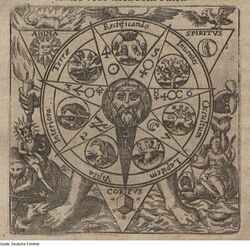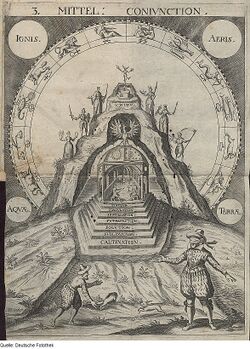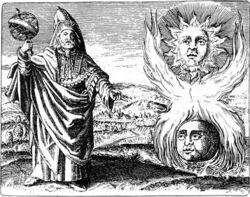Biology:Outline of alchemy
From HandWiki
Short description: Overview of and topical guide to alchemy
The following outline is provided as an overview of and topical guide to alchemy:
Alchemy – A philosophical tradition recognized as protoscience, that includes the application of Hermetic principles, and practices related to mythology, religion, and spirituality.
Branches
- Alchemy and chemistry in medieval Islam
- Chinese Alchemy
- Neidan
- Processing (Chinese materia medica)
- Iatrochemistry
- New Age
- Psychoanalysis
- Rasayana
Influences
Influences upon alchemy – alchemy developed dependent on a number of influences and experienced regional and period-specific variations:
- Aristotelianism
- Esotericism
- Western Esotericism
- Gnosticism
- Hermeticism
- Humorism
- Metallurgy
- History of metallurgy in the Indian subcontinent
- Platonism
- Pseudoscience
- Pythagoreanism
- Taoism
- Stoicism
Related fields
- Anthroposophy
- Astrology
- Ayurveda
- Homeopathy
- Kayaku-Jutsu
- Magic, magick
- Moxibustion
- Tay al-Ard
- Yoga Nidra
Concepts
- Alchemical elements – Primarily the four Classical elements of:
- Alchemy in art and entertainment
- Alkahest
- Anima mundi
- Chrysopoeia
- Filius philosophorum
- Takwin
- Philosopher's stone
- Prima materia
- Yliaster
- Septenary of the seven metals and Classical planets in Western alchemy
- Tria Prima (three primes)
- Unity of opposites or coincidentia oppositorum
- Hieros Gamos
- Rebis
Processes
Magnum opus – great work of alchemy consisting of:
- Nigredo
- Albedo
- Citrinitas (sometimes excluded)
- Rubedo
Alchemists also engaged in practical and symbolic processes including:
- Calcination
- Ceration
- Cohobation
- Congelation
- Digestion
- Distillation
- Fermentation
- Filtration
- Fixation
- Multiplication
- Projection
- Solution
- Sublimation
Symbolism
1. Glyphs
2. Imagery
- Suns in alchemy
- Undine (alchemy)
3. Visual Symbolism
- Porta Alchemica
- Serpent (symbolism)
Scientific connections
- Biological transmutation
- Chemistry
- Historicism
- Nuclear transmutation
- Obsolete scientific theories
- Physics
- Scientific method
- Synthesis of noble metals
Substances of the alchemists
- phosphorus • sulfur (sulphur) • arsenic • antimony
- vitriol • quartz • cinnabar • pyrites • orpiment • galena
- magnesia • lime • potash • natron • saltpetre • kohl
- ammonia • ammonium chloride • alcohol • camphor
- sulfuric acid (sulphuric acid) • hydrochloric acid • nitric acid • acetic acid • formic acid • citric acid • tartaric acid
- aqua regia • gunpowder
- blue vitriol • green vitriol • vinegar • salt
Apparatus
Stills
Vessels
Heating devices
Alchemy organizations
- Bibliotheca Philosophica Hermetica
- European Society for the Study of Western Esotericism
- Freemasonry
- Rosicrucianism
Alchemical texts
- Axiom of Maria
- Alchemical Studies (Carl Jung)
- Aurora consurgens
- Buch der heiligen Dreifaltigkeit
- Cantong qi
- Chymical Wedding of Christian Rosenkreutz
- Hermetica
- Emerald Tablet
- Sirr al-khalīqa ("The Secret of Creation")
- The Hermetical Triumph
- Fasciculus Chemicus
- Musaeum Hermeticum
- Mutus Liber
- Rosary of the Philosophers
- Splendor Solis
- Theatrum Chemicum
- Theatrum Chemicum Britannicum
- The Mirror of Alchimy
- Turba Philosophorum
Journals
- Ambix
- Aries
- Early Science and Medicine
- Isis
Alchemists
The most influential names in the history of alchemy include:
- Hermes Trismegistus – by tradition, the founder of Western alchemy; many alchemical works were attributed to him.
- Wei Boyang – authored the earliest known book on theoretical alchemy in China.
- Pseudo-Democritus – anonymous author of the oldest extant works of Greco-Egyptian alchemy.
- Zosimos of Panopolis – influential Greco-Egyptian alchemist.
- Khālid ibn Yazīd – credited with introducing alchemy to the Islamic world.
- Pseudo-Apollonius of Tyana – earliest known source of the sulfur-mercury theory of metals and the Emerald Tablet.
- Jābir ibn Hayyān – notable for the theory of the balance (ʿilm al-mīzān), the theory of artificial generation (ʿilm al-takwīn), and a general emphasis on experimental science.
- Pseudo-Geber – later Latin alchemist who wrote the influential Summa perfectionis.
- Roger Bacon – staunch proponent of the use of alchemy.
- Paracelsus – developer of iatrochemistry.
- Robert Boyle – alchemist critical of Paracelsus, credited as the father of modern chemistry.
- Mary Anne Atwood – key figure in the occult revival of alchemy.
- Carl Jung – merged alchemy and psychoanalytic thought.
See also
External links
- SHAC: Society for the History of Alchemy and Chemistry
- ESSWE: European Society for the Study of Western Esotericism
- Association for the Study of Esotericism
- The Alchemy Website. – Adam McLean's online collections and academic discussion.
- Inner Garden Alchemy Research Group: a non-profit foundation that aims to transmit the alchemical tradition.
- Dictionary of the History of Ideas: Alchemy
- Book of Secrets: Alchemy and the European Imagination, 1500-2000 – A digital exhibition from the Beinecke Rare Book and Manuscript Library at Yale University
 |





